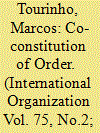| Srl | Item |
| 1 |
ID:
178550


|
|
|
|
|
| Summary/Abstract |
The idea of liberal international order as a world order is understood to be constituted as a result of disproportionate Anglo-American influences. This is in line with much of international relations (IR) theory, which typically characterizes the emergence of order as resulting from the diffusion or imposition of norms and institutions from the world's centers of power. This article argues otherwise, its premise being that the international order founded on sovereign equal nation-states was co-constituted as well by the influence of relatively weak actors through decentralized processes of contestation over core international norms. Drawing on international relations, history, and law, this article outlines a framework to interpret the actions and mechanisms by which supposedly weak actors shaped international order. It concisely traces the constitution of order as based on its fundamental norms and assesses the implications of the argument for the current crisis of liberal order, as well as IR theory more broadly, laying out a research agenda for the future.
|
|
|
|
|
|
|
|
|
|
|
|
|
|
|
|
| 2 |
ID:
142437


|
|
|
|
|
| Summary/Abstract |
This article explores the normative and institutional implications of the long-term use of individual sanctions by the United Nations Security Council (UNSC). It identifies the systematic and extensive use of individual sanctions as the most fundamental qualitative change in international sanctions policy during this century. It argues that policy is developing towards their use not only in order to address international crises and disputes of relatively limited scope and duration, but also to address enduring criminal activities, notably (but not exclusively) related to terrorism. While these sanctions remain associated with threats to international peace and security in the classic sense, they have in many cases transformed into long-term confiscations of individual assets, instead of temporary freezes. The UNSC, designed to address international crises on an exceptional basis, now engages in permanent sequestrations and is tasked with the monitoring of individual criminal activities on a massive scale. While individual sanctions have on some occasions proven effective, their systematic use by inadequate institutions complicates the Council's implementation of sanctions and undermines its legitimacy.
|
|
|
|
|
|
|
|
|
|
|
|
|
|
|
|